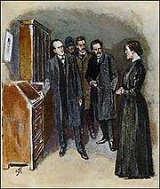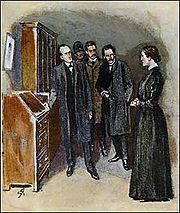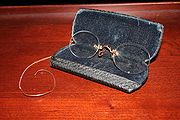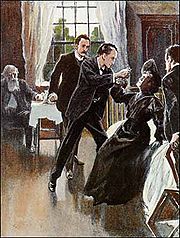
The Adventure of the Golden Pince-Nez
Encyclopedia
"The Adventure of the Golden Pince-Nez", one of the 56 Sherlock Holmes
short stories written by British author Sir Arthur Conan Doyle
, is one of 13 stories in the cycle collected as The Return of Sherlock Holmes
.
 One wretched November night, Inspector Stanley Hopkins comes to see Holmes at 221B Baker Street
One wretched November night, Inspector Stanley Hopkins comes to see Holmes at 221B Baker Street
to tell him of a murder
that defies solution. The dead man is Willoughby Smith, secretary to Professor Coram, an old invalid. The murder happened at Yoxley Old Place near Chatham, Kent. The most perplexing thing about the case to Hopkins is that it is apparently motiveless. Willoughby Smith seems to have nothing untoward in his background, and not an enemy in the world. He was the third secretary to the professor
, the former ones not having worked out. The murder weapon was a sealing-wax knife belonging to the professor.
The maid
found Smith, and the last words that he uttered as he lay dying were “The professor–it was she.” The professor, however, is a man.
This same maid told Hopkins while he was at Yoxley that she had heard Smith leave his room and walk down to the study. She had been hanging curtains and did not actually see him, only recognizing his brisk step. The professor was in bed at the time. A minute later, there was a hoarse scream from the study, and the maid, after hesitating for a moment, went there to find a murder scene. She later tells Holmes that Smith went out for a walk not long before the murder.
The murderer’s only likely means of entry was through the back door after walking along the path from the road, and Hopkins found some indistinct footmarks running beside the path, the murderer obviously having tried to avoid leaving a trail. Hopkins could not tell whether the track was coming or going, made by big or small feet. The road was a hopeless quagmire and nothing could be discerned there.
The professor’s study
contained a bureau
; nothing seemed to have been stolen. Its drawers were left open, as always, and the cupboard in the middle was locked. The professor kept the key.
 One important piece of evidence was found in Willoughby Smith’s hand: a pair of gold
One important piece of evidence was found in Willoughby Smith’s hand: a pair of gold
en pince-nez
glasses. Holmes examines these and from them alone deduces several things about the murderer:
Holmes, Dr. Watson, and Hopkins all go to Yoxley the next day, and Holmes makes a careful examination of everything. In the study, he notices a recent scratch on the bureau, and reasons that the murderer’s purpose was actually to fetch something from in there. Smith was killed merely because he had interfered with a burglary
. No-one saw the murderer leave, nor did anyone hear a door opening.
Holmes notes with some interest that both the corridors, the one leading from the back door and the one leading to the professor’s bedroom, are about the same length, and lined with coconut matting.
Holmes interviews the professor in his bedroom, smoking many Egyptian cigarettes
while there, dropping the ashes everywhere. The professor claims utter ignorance as to what has happened in his house, and ventures the hypothesis that Smith’s death might have been suicide
. Holmes asks about the locked cupboard in the bureau. The professor hands over the key. Holmes looks at it and then hands it back, not bothering to look in the bureau.
Shortly afterwards, Watson asks Holmes if he has a clue, and Holmes enigmatically replies that the cigarettes might show him.
Holmes meets the housekeeper
in the garden and has a seemingly unimportant chat with her about the professor’s eating habits. Apparently he has been eating quite a lot today.
The three men go back to see the professor in his room early in the afternoon and Holmes deliberately knocks the cigarettes over to provide an excuse for grovelling on the floor. At this point, he solves the mystery, and the murderer, who looks exactly as Holmes deduced, emerges from a hiding place in a bookcase. Holmes has seen her tracks in the cigarette ashes.
The business unfolded thus: The woman came to the professor’s house to get hold of some documents having obtained a duplicate key from one of the former secretaries. She came without the professor’s knowledge. She was surprised by Smith, whom she killed without meaning to, grabbing the nearest thing to defend herself — the sealing-wax knife. She lost her glasses in the scramble to escape, and was quite helpless. She turned along the wrong corridor and wound up in the professor’s room. He hid her. It turns out that she is the professor’s wife, Anna, and they are both Russia
n. The document in question would exonerate her friend in a Siberia
n prison. She and this friend were both betrayed by the Professor for gain.
 Anna had met Smith while he was taking his walk, explaining Smith’s last words.
Anna had met Smith while he was taking his walk, explaining Smith’s last words.
The professor’s increased appetite is of course explained by his having to feed a second, hidden person.
Anna also commits suicide by poison
ing. She asks Holmes to deliver the documents to the Russian Embassy, which he duly does.
Doyle's story was published within a very short time of The Secret Agent
, Joseph Conrad
's 1907 novel. While very different from each other, the two share the same background, highly relevant for the time - the struggle between the Russia
n Czar and the revolutionaries who were soon to overthrow him, enacted by exiles on British soil.
followed the original story, except that at the end the Professor is killed by a Revolutionary whom he had betrayed, and Dr. Watson is replaced by Sherlock Holmes's brother, Mycroft Holmes
.
During Holmes' brother's investigation at the crime scene with Inspector Hopkins, Sherlock Holmes mumbles about the irony that their father gave his magnifying glass to Mycroft who has always been depicted as lazy and lethargic. Also, Mycroft Holmes remarks that their father always said that after eliminating the impossible whatever remains, however improbable, must be the truth. Both of these incidents are deviations from the original piece and remarkably, both of them refers to Holmes brothers' father whom has never been mentioned in the original Doyle writings.
In the BBC Radio version called The Golden Pince-nez, while in custody, Anna jumps in front of a train. Holmes (Clive Merrison
) remarks this how is Anna Karenina
dies. The novel figures in this version.
Sherlock Holmes
Sherlock Holmes is a fictional detective created by Scottish author and physician Sir Arthur Conan Doyle. The fantastic London-based "consulting detective", Holmes is famous for his astute logical reasoning, his ability to take almost any disguise, and his use of forensic science skills to solve...
short stories written by British author Sir Arthur Conan Doyle
Arthur Conan Doyle
Sir Arthur Ignatius Conan Doyle DL was a Scottish physician and writer, most noted for his stories about the detective Sherlock Holmes, generally considered a milestone in the field of crime fiction, and for the adventures of Professor Challenger...
, is one of 13 stories in the cycle collected as The Return of Sherlock Holmes
The Return of Sherlock Holmes
The Return of Sherlock Holmes is a collection of 13 Sherlock Holmes stories, originally published in 1903-1904, by Arthur Conan Doyle.-History:...
.
Synopsis

221B Baker Street
221B Baker Street is the London address of the fictional detective Sherlock Holmes, created by author Sir Arthur Conan Doyle. In the United Kingdom, postal addresses with a number followed by a letter may indicate a separate address within a larger, often residential building...
to tell him of a murder
Murder
Murder is the unlawful killing, with malice aforethought, of another human being, and generally this state of mind distinguishes murder from other forms of unlawful homicide...
that defies solution. The dead man is Willoughby Smith, secretary to Professor Coram, an old invalid. The murder happened at Yoxley Old Place near Chatham, Kent. The most perplexing thing about the case to Hopkins is that it is apparently motiveless. Willoughby Smith seems to have nothing untoward in his background, and not an enemy in the world. He was the third secretary to the professor
Professor
A professor is a scholarly teacher; the precise meaning of the term varies by country. Literally, professor derives from Latin as a "person who professes" being usually an expert in arts or sciences; a teacher of high rank...
, the former ones not having worked out. The murder weapon was a sealing-wax knife belonging to the professor.
The maid
Maid
A maidservant or in current usage housemaid or maid is a female employed in domestic service.-Description:Once part of an elaborate hierarchy in great houses, today a single maid may be the only domestic worker that upper and even middle-income households can afford, as was historically the case...
found Smith, and the last words that he uttered as he lay dying were “The professor–it was she.” The professor, however, is a man.
This same maid told Hopkins while he was at Yoxley that she had heard Smith leave his room and walk down to the study. She had been hanging curtains and did not actually see him, only recognizing his brisk step. The professor was in bed at the time. A minute later, there was a hoarse scream from the study, and the maid, after hesitating for a moment, went there to find a murder scene. She later tells Holmes that Smith went out for a walk not long before the murder.
The murderer’s only likely means of entry was through the back door after walking along the path from the road, and Hopkins found some indistinct footmarks running beside the path, the murderer obviously having tried to avoid leaving a trail. Hopkins could not tell whether the track was coming or going, made by big or small feet. The road was a hopeless quagmire and nothing could be discerned there.
The professor’s study
Study (room)
A study is a room in a house which is used for paperwork, computer work, or reading. Historically, the study of a house was reserved for use as the private office and reading room of a family father as the formal head of a household, but today studies are generally either used to operate a home...
contained a bureau
Desk
A desk is a furniture form and a class of table often used in a work or office setting for reading or writing on or using a computer. Desks often have one or more drawers to store office supplies and papers. Unlike a regular table, usually only one side of a desk is suitable to sit on . Not all...
; nothing seemed to have been stolen. Its drawers were left open, as always, and the cupboard in the middle was locked. The professor kept the key.

Gold
Gold is a chemical element with the symbol Au and an atomic number of 79. Gold is a dense, soft, shiny, malleable and ductile metal. Pure gold has a bright yellow color and luster traditionally considered attractive, which it maintains without oxidizing in air or water. Chemically, gold is a...
en pince-nez
Pince-nez
Pince-nez are a style of spectacles, popular in the 19th century, which are supported without earpieces, by pinching the bridge of the nose. The name comes from French pincer, to pinch, and nez, nose....
glasses. Holmes examines these and from them alone deduces several things about the murderer:
- It is a woman;
- She is of some good breeding;
- She dresses like a lady;
- She has a thick nose;
- Her eyes are close together;
- She has a puckered forehead, a peering look, and likely rounded shoulders;
- She has been to an opticianOpticianAn optician is a person who is trained to fill prescriptions for eye correction in the field of medicine, also known as a dispensing optician or optician, dispensing...
at least twice over the last few months. - She has a lot of money
Holmes, Dr. Watson, and Hopkins all go to Yoxley the next day, and Holmes makes a careful examination of everything. In the study, he notices a recent scratch on the bureau, and reasons that the murderer’s purpose was actually to fetch something from in there. Smith was killed merely because he had interfered with a burglary
Burglary
Burglary is a crime, the essence of which is illicit entry into a building for the purposes of committing an offense. Usually that offense will be theft, but most jurisdictions specify others which fall within the ambit of burglary...
. No-one saw the murderer leave, nor did anyone hear a door opening.
Holmes notes with some interest that both the corridors, the one leading from the back door and the one leading to the professor’s bedroom, are about the same length, and lined with coconut matting.
Holmes interviews the professor in his bedroom, smoking many Egyptian cigarettes
Egyptian cigarette industry
The Egyptian cigarette industry, during the period between the 1880s and the end of the First World War, was a major export industry that influenced global fashion...
while there, dropping the ashes everywhere. The professor claims utter ignorance as to what has happened in his house, and ventures the hypothesis that Smith’s death might have been suicide
Suicide
Suicide is the act of intentionally causing one's own death. Suicide is often committed out of despair or attributed to some underlying mental disorder, such as depression, bipolar disorder, schizophrenia, alcoholism, or drug abuse...
. Holmes asks about the locked cupboard in the bureau. The professor hands over the key. Holmes looks at it and then hands it back, not bothering to look in the bureau.
Shortly afterwards, Watson asks Holmes if he has a clue, and Holmes enigmatically replies that the cigarettes might show him.
Holmes meets the housekeeper
Housekeeper (servant)
A housekeeper is an individual responsible for the cleaning and maintenance of the interior of a residence, including direction of subordinate maids...
in the garden and has a seemingly unimportant chat with her about the professor’s eating habits. Apparently he has been eating quite a lot today.
The three men go back to see the professor in his room early in the afternoon and Holmes deliberately knocks the cigarettes over to provide an excuse for grovelling on the floor. At this point, he solves the mystery, and the murderer, who looks exactly as Holmes deduced, emerges from a hiding place in a bookcase. Holmes has seen her tracks in the cigarette ashes.
The business unfolded thus: The woman came to the professor’s house to get hold of some documents having obtained a duplicate key from one of the former secretaries. She came without the professor’s knowledge. She was surprised by Smith, whom she killed without meaning to, grabbing the nearest thing to defend herself — the sealing-wax knife. She lost her glasses in the scramble to escape, and was quite helpless. She turned along the wrong corridor and wound up in the professor’s room. He hid her. It turns out that she is the professor’s wife, Anna, and they are both Russia
Russia
Russia or , officially known as both Russia and the Russian Federation , is a country in northern Eurasia. It is a federal semi-presidential republic, comprising 83 federal subjects...
n. The document in question would exonerate her friend in a Siberia
Siberia
Siberia is an extensive region constituting almost all of Northern Asia. Comprising the central and eastern portion of the Russian Federation, it was part of the Soviet Union from its beginning, as its predecessor states, the Tsardom of Russia and the Russian Empire, conquered it during the 16th...
n prison. She and this friend were both betrayed by the Professor for gain.

The professor’s increased appetite is of course explained by his having to feed a second, hidden person.
Anna also commits suicide by poison
Poison
In the context of biology, poisons are substances that can cause disturbances to organisms, usually by chemical reaction or other activity on the molecular scale, when a sufficient quantity is absorbed by an organism....
ing. She asks Holmes to deliver the documents to the Russian Embassy, which he duly does.
Doyle's story was published within a very short time of The Secret Agent
The Secret Agent
The Secret Agent: A Simple Tale is a novel by Joseph Conrad published in 1907. The story is set in London in 1886 and deals largely with the life of Mr. Verloc and his job as a spy. The Secret Agent is also notable as it is one of Conrad's later political novels, which move away from his typical...
, Joseph Conrad
Joseph Conrad
Joseph Conrad was a Polish-born English novelist.Conrad is regarded as one of the great novelists in English, although he did not speak the language fluently until he was in his twenties...
's 1907 novel. While very different from each other, the two share the same background, highly relevant for the time - the struggle between the Russia
Russia
Russia or , officially known as both Russia and the Russian Federation , is a country in northern Eurasia. It is a federal semi-presidential republic, comprising 83 federal subjects...
n Czar and the revolutionaries who were soon to overthrow him, enacted by exiles on British soil.
Other media
The Granada TV series with Jeremy BrettJeremy Brett
Jeremy Brett , born Peter Jeremy William Huggins, was an English actor, most famous for his portrayal of Sherlock Holmes in four Granada TV series.-Early life:...
followed the original story, except that at the end the Professor is killed by a Revolutionary whom he had betrayed, and Dr. Watson is replaced by Sherlock Holmes's brother, Mycroft Holmes
Mycroft Holmes
Mycroft Holmes is a fictional character in the stories written by Arthur Conan Doyle. He is the elder brother of the famous detective Sherlock Holmes.- Profile :...
.
During Holmes' brother's investigation at the crime scene with Inspector Hopkins, Sherlock Holmes mumbles about the irony that their father gave his magnifying glass to Mycroft who has always been depicted as lazy and lethargic. Also, Mycroft Holmes remarks that their father always said that after eliminating the impossible whatever remains, however improbable, must be the truth. Both of these incidents are deviations from the original piece and remarkably, both of them refers to Holmes brothers' father whom has never been mentioned in the original Doyle writings.
In the BBC Radio version called The Golden Pince-nez, while in custody, Anna jumps in front of a train. Holmes (Clive Merrison
Clive Merrison
Clive Merrison is a Welsh actor of film, television, stage and radio. He trained at Rose Bruford College.- Television :...
) remarks this how is Anna Karenina
Anna Karenina
Anna Karenina is a novel by the Russian writer Leo Tolstoy, published in serial installments from 1873 to 1877 in the periodical The Russian Messenger...
dies. The novel figures in this version.

